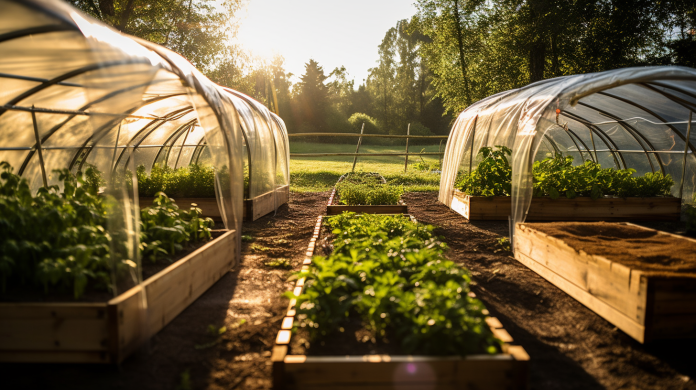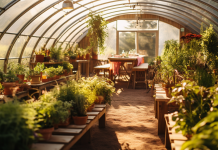Have you considered the benefits of a polytunnel for year-round herb cultivation? A polytunnel offers a controlled environment that can be advantageous for gardeners. In this guide, we'll delve into herb gardening within a polytunnel and outdoors, providing insights and practical advice.
Benefits of Growing Herbs in a Polytunnel
A polytunnel allows for raised beds so enhancing drainage and reducing the chances of waterlogged soil. This environment can be beneficial for preventing root rot and offers better control over your herb's growth conditions.
In a polytunnel, you also have the opportunity to experiment. For instance, you can test different fertilizers and pest control methods. A few observations from my gardening journey:
- very small propagation trays will require more repotting.
- Sun loving herbs like basil are better ‘started’ in the house.
- Start the marigold early. Marigold attracts ladybirds & they love aphids.
- Don't forget the vermiculite
Best Herbs for Your Outdoor Garden
For outdoor gardens, culinary herbs like basil and rosemary are popular choices. They not only add flavor to dishes but also thrive in outdoor conditions. Medicinal herbs like chamomile and lavender can also be beneficial for their therapeutic properties.
Diving Deeper into Outdoor Herbs
Gardening outdoors offers a unique experience, different from the controlled environment of a polytunnel. The open air, the natural rhythm of seasons, and the direct connection with the earth make outdoor herb gardening a therapeutic endeavor.
Why Choose Outdoor?
- Natural Elements: Herbs grown outdoors benefit from natural sunlight, rainwater, and the ecosystem's beneficial insects. This often results in robust plants with intense flavors and aromas.
- Space: Unlike restricted indoor spaces, outdoor gardens can accommodate larger herb plants like fennel, dill, or bay trees, which need room to spread and grow.
- Biodiversity: Outdoor gardens attract pollinators like bees and butterflies, promoting a healthy ecosystem. This biodiversity can lead to better pollination and increased herb yields.
- Placement: some herbs like full sun, others prefer shade, some are annual, some are perennial.
Challenges and Solutions:
While outdoor gardening has its perks, it's not without challenges. Pests, unpredictable weather, and soil issues can sometimes be a concern. However, with a bit of knowledge and preparation, these challenges can be managed:
– Pests: Introduce beneficial insects like ladybugs or use organic repellents to keep harmful pests at bay.
– Weather: Use mulch to retain soil moisture during dry spells and consider shade cloths to protect herbs from intense sunlight.
– Soil: Regularly enrich the soil with compost and organic matter to ensure it remains fertile and well-draining.
Herbs That Love the Outdoors:
While many herbs can be grown both indoors and out, some truly thrive when planted outdoors:
– Mint: This herb can be invasive, so giving it space outdoors is ideal. It loves slightly damp soil and partial shade.
– Chives: These onion relatives enjoy full sun and return year after year, offering beautiful purple blooms.
– Oregano: A staple in Mediterranean cuisine, oregano loves the sun and well-drained soil.
– Sage: With its silvery leaves and lovely blue flowers, sage is both culinary and ornamental.
Tips for Thriving Herbs in Your Polytunnel
Here are some suggestions for successful herb cultivation in a polytunnel:
- Choose Suitable Herbs: Some herbs, like basil and parsley, prefer the conditions of a polytunnel.
- Ensure Proper Ventilation: Consider adding vents for fresh air circulation.
- Regular Maintenance: Monitor for pests and prune as needed for optimal growth.
Essential Tools for Your Herb Garden
A few essential tools can make a difference in your gardening experience:
– Hand Trowel: Useful for planting. I know someone (he shall remain nameless) who has a coring attachment for their hand drill (Power Planter). This is ridiculous, although I reserve the right to change my mind.. lol.
– Pruning Shears / or scissors: For trimming herbs.
– Watering Can: To keep your herbs hydrated. Whilst you may prefer a spray hose the trusty can approach allows you to ‘check' everything as you go along.
– Hoe: For weed removal.
Tip: hoe on a sunny day; handweed on a wet one.
Harvesting and Preserving Your Herbal Bounty
When it's time to harvest, pick your herbs during the morning for best results. For preservation, you can store them fresh, freeze, or dry them based on your preference.
Tips:
Many modern air-fryers have a dehydration function for drying herbs.
Many modern cookers / or old ranges have a plate warmer section useful for drying herbs.
Some Herb Facts
| Herb | Lifespan | Average Height | Space Required (cm) | Sun/Shade | Useful Fact |
| Mint | Perennial | 30-60 cm | 30-45 cm | Full Sun to Partial Shade | Mint can be invasive, so it's often best planted in containers to control its spread. |
| Basil | Annual | 25-50 cm | 20-30 cm | Full Sun | Basil is sensitive to frost and thrives in warm conditions. It's also a favorite of bees and butterflies. |
| Chives | Perennial | 30-50 cm | 20-30 cm | Full Sun | Chives produce beautiful purple flowers in spring, which are also edible and have a mild onion flavor. |
| Oregano | Perennial | 40-80 cm | 30-40 cm | Full Sun | Oregano can be harvested multiple times in one growing season and is often used dried in Italian dishes. |
| Sage | Perennial | 30-60 cm | 40-50 cm | Full Sun | Sage has aromatic leaves and is often used in stuffings and meat dishes. It also has medicinal properties. |
Key Takeaways
– Polytunnels provide a controlled environment for herbs.
– Experimentation can offer insights into effective gardening practices.
– Choosing the right tools and herbs is crucial for success.
– Herb Selection: Different herbs have varying requirements. While some thrive in controlled environments like polytunnels, others, like mint, prefer the open garden.
Conclusion
Gardening is both a science and an art. Whether you're using a polytunnel or an open garden, the experience of growing herbs is rewarding. With the right approach and tools, you can enjoy the benefits of herb gardening. If you can cook or know someone who can you'll need herbs. 🙂
Whether you're sprinkling fresh basil on a pizza or brewing a cup of chamomile tea, the joys of your own fresh herbs are endless.
Please see our supporting article:
Creating a Herb Garden Sanctuary



